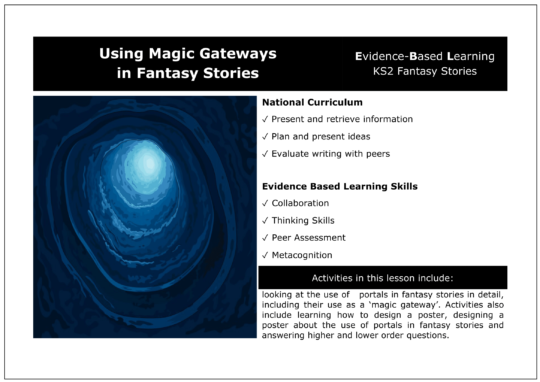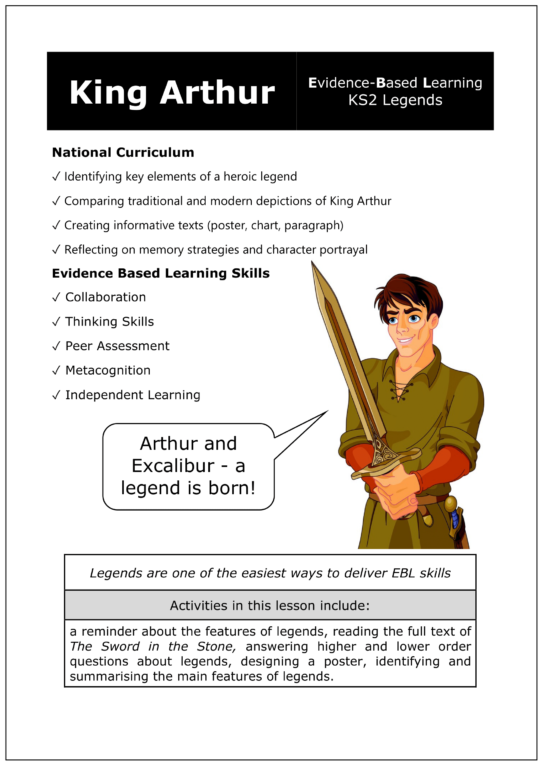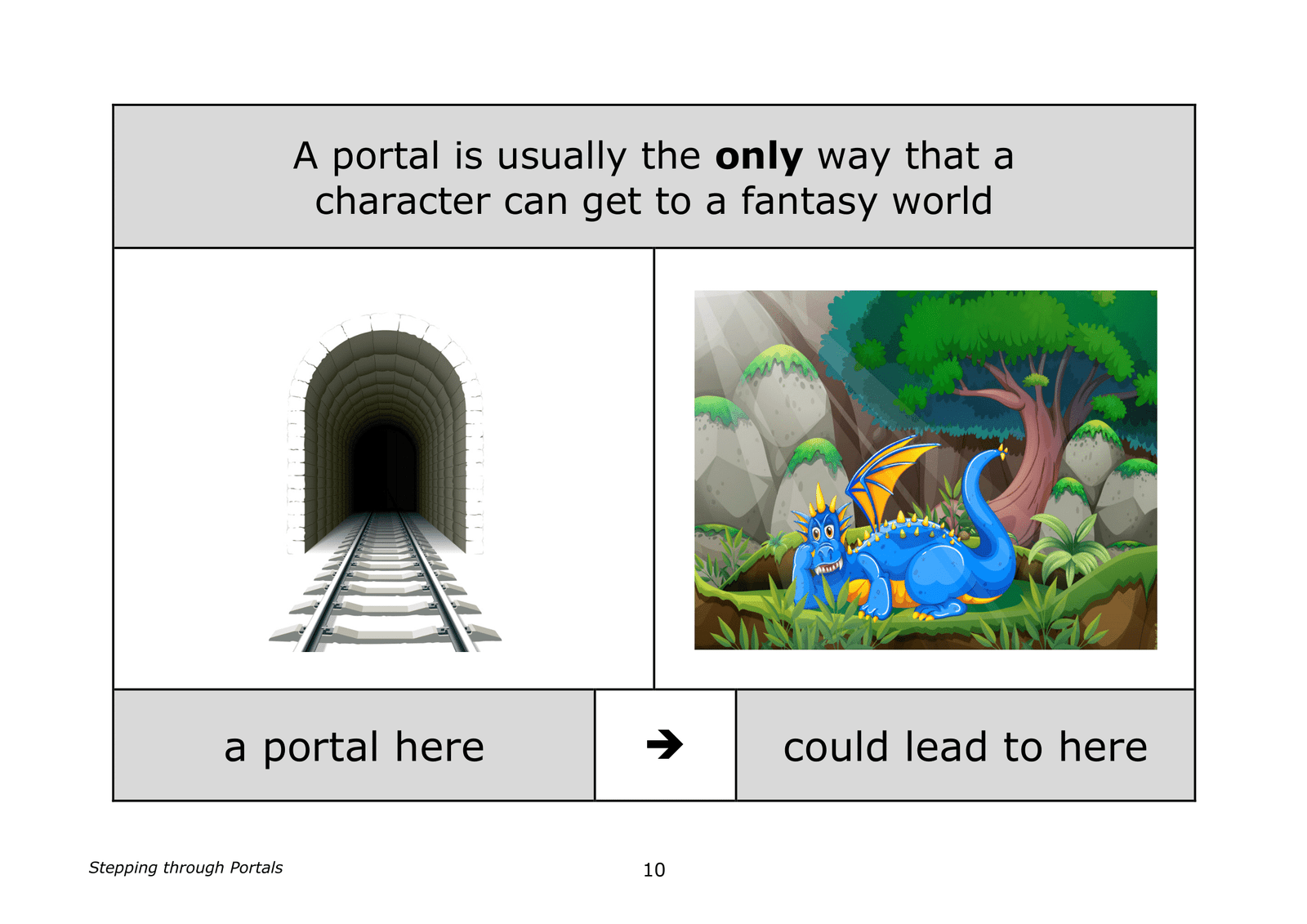Y6 Stepping through Portals
£3.00
KS2 National Curriculum:
✓ Make comparisons across books
✓ Ask and answer higher-level questions
✓ Develop collaborative learning
This lesson compares the role of portals in keeping the fantasy and real worlds separate in traditional fantasy stories such as Alice in Wonderland with the combining of these worlds in later fantasy stories such as Harry Potter. Activities include answering higher and lower order questions.
There is a five-minute evidence-based CPD activity at the end of this lesson which will develop classroom teachers’ skill set. This CPD consists of a research extract on peer teaching with a five-minute activity based on this extract.
Description
These evidence-based learning (EBL) lessons are based on classroom practice that has been proven, by research, to maximise thinking, learning and attainment. From an extensive review of educational research, we identified the eight key classroom thinking and learning skills that were common across these research papers. We named these eight key skills “EBL skills”.
EBL skills have been proven by research to maximise learning because they combine the most productive thinking skills with the most effective learning behaviours. Each of our evidence-based learning lessons uses the English curriculum as a framework through which the eight EBL skills are delivered.
Teachers also have the opportunity to add to their own skill set or refresh their existing skills with our five-minute CPD activity, based on one of the EBL skills used in this lesson.
The skills in bold below are the EBL skills developed in this Fantasy Story lesson. Click on each skill to learn more about that skill.
- Collaboration
- Thinking Skills
- Peer Assessment
- Peer Teaching
- Self-Assessment
- Metacognition
- Self-Regulation
- Independent Learning
1 review for Y6 Stepping through Portals
Only logged in customers who have purchased this product may leave a review.
Related products
-


Y6 Using Magic Gateways in Fantasy Stories
£3.00 Add to basket £3.00Add to basket
£3.00Add to basketKS2 National Curriculum:
✓ Present and retrieve information
✓ Plan and present ideas
✓ Evaluate writing with peersActivities in this lesson include looking at the use of portals in fantasy stories in detail, including their use as a ‘magic gateway’. Activities also include learning how to design a poster, designing a poster about the use of portals in fantasy stories and answering higher and lower order questions.
There is a five-minute evidence-based CPD activity at the end of this lesson which will develop classroom teachers’ skill set. This CPD consists of a research extract on metacognition with a five-minute activity based on this extract.
VIEW -


Y5 Super Settings
£3.00 Add to basket £3.00Add to basket
£3.00Add to basketKS2 National Curriculum:
✓ Comparing fantasy, sci-fi, pirate, and traditional settings
✓ Spotting patterns in descriptive language and story type
✓ Explaining how settings influence tone and events
✓ Writing comparative statements and reflectionsThis lesson explores why different types of stories have different settings and it compares real and imaginary settings. Activities include answering higher and lower order questions.
There is a five-minute evidence-based CPD activity at the end of this lesson which will develop classroom teachers’ skill set. This CPD consists of a research extract on peer teaching with a five-minute activity based on this extract.
VIEW -


Y5 Alice, the White Rabbit and the Portal
£3.00 Add to basket £3.00Add to basket
£3.00Add to basketKS2 National Curriculum:
✓ Identify themes and conventions
✓ Understand story structure
✓ Develop speaking and listening through partner workActivities in this lesson include exploring the key components of fantasy stories: real and imaginary settings, real and imaginary characters, good vs evil, real journeys vs portals, the passing of time and the use of magic. Activities also include answering higher and lower order questions.
There is a five-minute evidence-based CPD activity at the end of this lesson which will develop classroom teachers’ skill set. This CPD consists of a research extract on collaboration with a five-minute activity based on this extract.
VIEW -


Y6 The Legend of King Arthur
£3.00 Add to basket £3.00Add to basket
£3.00Add to basketKS2 National Curriculum:
✓ Identifying key elements of a heroic legend
✓ Comparing traditional and modern depictions of King Arthur
✓ Creating informative texts (poster, chart, paragraph)
✓ Reflecting on memory strategies and character portrayalActivities in this lesson include a reminder about the features of legends, reading the full text of The Sword in the Stone, answering higher and lower order questions about legends, designing a poster, identifying and summarising the main features of legends.
There is a five-minute evidence-based CPD activity at the end of this lesson which will develop classroom teachers’ skill set. This CPD consists of a research extract on metacognition with a five-minute activity based on this extract.
VIEW






Philipem (verified owner) –
We asked a.i. to review this lesson. This is what it said:
Here is a draft blog post for teachers on the “Stepping through Portals” lesson:
Teachers – Lead Your Students Through the Portal to Deeper Learning! 🚪
I’ve just discovered an inventive KS2 English resource that compares how fantasy worlds are created in traditional tales vs modern stories. By analyzing the role of magical portals in classics like Alice in Wonderland and newer series like Harry Potter, students develop English and thinking abilities. 🧠
Activities range from identifying real vs imaginary settings and characters to explaining why time stands still in fantasy lands. Higher and lower order questions encourage critical analysis at multiple levels. Students also get to teach peers about portal conventions, allowing them to verbalise and embed their understanding.
The side-by-side examination of portal usage in early fantasy works compared to contemporary ones is brilliant. It highlights how older stories kept magic lands fully separate from the real world whereas newer sagas like Harry Potter subtly merge the two realms.
As well as all the great literacy tasks, there’s an excellent 5-minute CPD section on the academic research showing peer teaching to be highly effective for driving motivation, engagement and deep learning.
The self-reflection prompt on providing students with more peer teaching opportunities is thought-provoking. Incorporating just a few minutes of peer teaching in each lesson can yield real cognitive gains! 📈
I’d give this multi-layered English lesson 5 stars 🌟🌟🌟🌟🌟 for using portals as a springboard to develop literacy, critical thinking and meaningful assessment. Teachers, transport your students to new heights today! 🚀